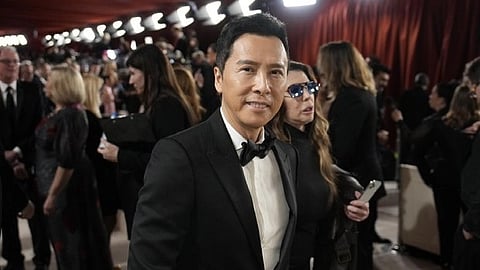
- Home
- NewsGram USA
- India
- न्यूजग्राम
- World
- Politics
- Opinion
- Entertainment
- On Ground
- Culture
- Lifestyle
- Economy
- Sports
- Sp. Coverage
- Misc.
- NewsGram Exclusive
- Jobs / Internships
- Interview

Donnie Yen arrives at the Oscars on March 12, 2023, at the Dolby Theatre in Los Angeles.
Donnie Yen
Hong Kong martial arts superstar Donnie Yen has hit back at more than 100,000 people who signed a petition calling for his removal from last month's Oscars ceremony due to his public support for Beijing, claiming the move was part of "cancel culture."
"I’m allowed to love my own culture, love my own country," Yen said in a recent interview with Variety. "Why cannot I be patriotic?"
"This whole online cyber-bullying/cancel culture has got to stop," he said of the petition calling on the Academy Awards to remove him as an award presenter after he called the 2019 pro-democracy movement in Hong Kong "a riot."
"You can’t own somebody’s thoughts. And you want to silence them? It’s totally hypocritical," Yen said.
Yen presented an award at the March 12 ceremony despite public criticism and street protests from pro-democracy activists and Chinese dissidents, who displayed photos of Yen shaking hands with Chinese President Xi Jinping in a celebrity line-up.
The protest, which was attended by former 1989 student leader Wang Dan, came as more than 110,000 people signed a petition on Change.org calling for Yen to be dropped from the ceremony.
Yen had earlier told GQ Hype magazine in a recent interview after being asked about the boycott of his movies and his view of the 2019 protest movement: “It wasn’t a protest, OK, it was a riot.”
“A lot of people might not be happy for what I’m saying, but I’m speaking from my own experience,” said Yen, using very similar language to official descriptions of the protests.
‘Form of silencing’
Taiwan-based petition co-author Tong Wai Hong, who was acquitted of “rioting” charges linked to his role in the 2019 protest movement, said creating and signing a petition was just a way for people to express their opinions, and didn't amount to cyber-bullying.
"He has the freedom to say what he likes, and we citizens are also free to use such methods to express our opposition to his remarks and his actions," Tong said.
"As an artist, he is a public figure, so his comments could mislead a lot of people and distort the truth, and were therefore irresponsible," he said.
Tong said the aim of the petition had never been to silence Yen.
"Instead, I would like to ask people in Hong Kong, people in the movie industry ... why they can't even talk about not being able to make [certain] movies, and why some films the public want to see can't be screened," he said.
"If the voices of the poorest and of all citizens aren't being heard, is that not also a form of silencing?" Tong said. "I think he should consider that instead."
Tong said that while the petition hadn't been successful in getting Yen removed from the Oscars ceremony, it was a rare example of a Hong Kong rights issue making world headlines.
"Usually, it's very rare for a Hong Kong human rights issue to make an international appearance," he said.
‘100% Chinese’
Yen was born in the southern city of Guangzhou, settling in Hong Kong at the age of 2, and emigrating to the United States at 12.
He renounced his American citizenship in 2010, saying publicly that he was "100% Chinese."
He was admitted as a delegate to the Communist Party's Chinese People's Political Consultative Conference in January 2023, following in the footsteps of Jackie Chan.
Many Hong Kongers started boycotting Yen's movies over his pro-Beijing stance during the 2019 protest movement against the erosion of Hong Kong's promised freedoms and judicial independence. [RFA/NS]
